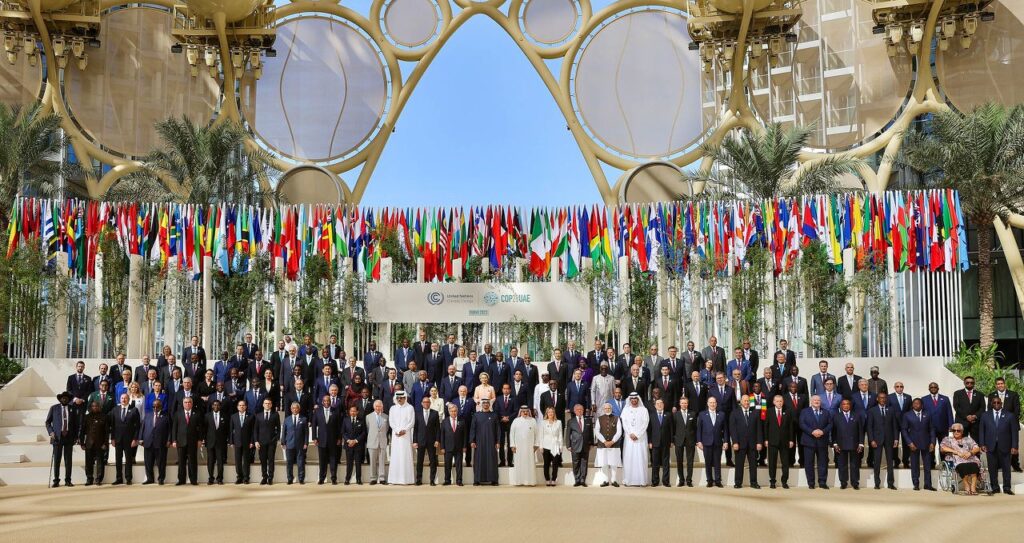The United Nations Framework Convention on Climate Change (UNFCCC) is an international treaty that has sought to alleviate the climate crisis since 1994. With common premises, strategic lines and commitments, it establishes a global cooperation framework that includes 197 countries and the European Union.
The Global Compact was born as one of the outcomes of the United Nations Conference on Environment and Development (UNCED) – better known as the “Earth Summit” – held in 1992 in Brazil. This summit established the so-called “Rio Conventions”, consisting of three agreements: the United Nations Convention on Biological Diversity, the Convention to Combat Desertification and, the issue at hand, the United Nations Framework Convention on Climate Change (UNFCCC) – which entered into force in 1994 after receiving sufficient support.
Large presence of the fossil fuel lobby
Known as the “Conference of the Parties”, the COP is an annual meeting of the UNFCCC’s Parties, where progress is showcased and policy directions for the environment are agreed.
Each edition is christened in chronological order, and the COP28 was recently held in Dubai, where a historic framework was established: “progress must be made towards the abandonment of fossil fuels”, the new text states. While this is an unprecedented event, it involved hours of negotiation overtime as countries, lobby groups and activists with disparate positions confronted each other. UN Secretary-General António Guterres pointed out that “to those who opposed a clear reference to the phase-out of fossil fuels in the COP28 text, I want to say that the phase-out of fossil fuels is inevitable, whether they like it or not. Let’s hope it doesn’t come too late.
For Ecologistas en Acción, the new text is
“a confusing wording that does not establish with the necessary clarity a differentiated end to fossil fuels in line with scientific indications”.
The alleged historic breakthrough coincides with the record presence of the fossil fuel lobby at this year’s COP, according to the Kick Big Polluters Out report. A total of 2456 representatives from this sector were accredited for the meeting. The study also notes that most of the registrants linked to fossil fuel lobbies are from the so-called “Global North” – major economic powers that emit large amounts of pollutants.
Criticism of the attendance of pressure groups at the COP is repeated year after year, and this time, the fact that the meeting was held in the largely oil-producing territory of Dubai, and that it was chaired by Sultan Al Jaber – the country’s Minister of Industry, but also CEO of ADNOC, the eighth largest oil company in the world – has been added to the list of criticisms. The Guardian newspaper published that in an online meeting on 21 November, in the framework of the COP, the president of the summit, Al Jaber, declared that “there is no science” that determines that giving up fossil fuels is favourable to achieving the objective of limiting global warming.
These statements clashed head-on with the mission of the COP itself, because for more than 450 environmental organisations “fossil fuel interests have invaded the UNFCCC and threaten its legitimacy”. In a joint letter they issued before the meeting, they say that “no COP overseen by a fossil fuel company executive can be considered legitimate. COP presidencies must be free of any influence from fossil fuel companies.

The science behind the need to move away from oil
Scientific evidence, however, is the strongest support for the goal of moving away from fossil fuels. The Intergovernmental Panel on Climate Change (IPCC) is a panel of experts convened by the United Nations to assess the state of the science on climate change. In its 2023 synthesis report, it states that “the burning of fossil fuels and the unequal and unsustainable use of energy and land for more than a century have led to global warming of 1.1°C above pre-industrial levels”.
The objective of the Paris Agreement, which was established in 2015 during the COP21 held in the French capital, is precisely to curb the increase in global warming so that it does not exceed 1.5 ºC above pre-industrial levels. Regarding the need to stay within this limit, the IPCC report states that “drastic, rapid and sustained reductions in greenhouse gas emissions in all sectors must be achieved. Emissions should already have declined and will need to be reduced by almost half by 2030 if warming is to be limited to 1.5°C”.


